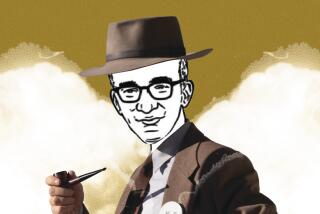Book Review : A Frolic in the World of Low-Tech
- Share via
The Man With No Endorphins and Other Reflections on Science by James Gorman (Viking: $15.95; 163 pages)
It isn’t often in this science-book-reviewing gig that I get to read a book that makes me laugh. I mean, one that’s really funny.
Face it. Most of the time I read about the origin of the universe or DNA or black holes or some such heady topic, occasionally interspersed with a biography in which the only untoward event in the subject’s life is that he once came to work 15 minutes late.
Not that I object, mind you. These books tend to be interesting and important, and it’s a living, after all. But it certainly was a pleasant change to read “The Man With No Endorphins” by James Gorman, a collection of amusing, highly personal essays on low-tech science that originally appeared in Discover magazine.
Here we read about small subjects: Toothpaste dispensers and the technology of toilets, flea killers and video games, micro-pigs and aquariums, all filtered through the author’s somewhat bemused, somewhat arch frame of mind.
“I’ve been convinced for some time,” he tells us, “that the purpose of science is to provide something to talk about when art and poetry and music lose their appeal.” There probably is no better definition.
Alternative to Electric Chair
The book is chock full of such observations. Speaking of the poisonous weeds that grow in his backyard, Gorman writes, “If capital punishment ever becomes widespread again they could bring condemned felons out here for a day in the country. Instead of the electric chair they could do a wild-foods lunch.”
When he was visiting the Fillpro toilet-valve plant near San Diego, Gorman found all of the bathrooms in the place out of order, prompting him to observe:
“During my entire tour of the plant the bathrooms were unusable, and plumbers were either searching for the problem or on their break. You can imagine how I felt. The prospect of a plumbing company about to be charged a fortune by plumbers will cause extreme and irresistible glee to toilet owners everywhere. I’ve nothing against Fillpro, but it’s nice to know that while there may not be justice in the world, at least there’s irony.”
A Simulated Killing
Later, Gorman writes of his experience using interactive videotapes that are intended to help teach medical students what to do in a hospital emergency room. A patient appears on the screen in a real-life setting, and the doctor-to-be must decide what to do. Here is Gorman’s account of how he killed the patient, one Eugene Wilson:
“The patient took a downhill turn. I ordered a consultant. He was on his way. I ordered a chaplain. Suddenly there was Eugene Wilson on the screen again, looking even worse. The nurse turned to me, and said, in what I thought was a rather accusatory tone, that the patient wasn’t breathing. Why do you think I called the chaplain? I thought to myself. Now I was starting to get irritated. I’d already cleared this guy’s airway and intubated him. What was the problem? I decided to give him a proctoscopy. I figured that ought to wake him up.”
It is impossible to dislike an author with such a clear sense of the absurdity and lunacy of the universe. Gorman has a delightful touch, and he doesn’t take himself too seriously. In fact, he doesn’t take anything too seriously, a healthy and refreshing attitude.
All to the good. But read one after the other, the style and tone of these essays, good as they are, gets to be a little repetitive. I suspect that they read better in small doses--perhaps one a month, as they originally appeared. Otherwise it’s like watching David Letterman for 24 hours straight.
A Minor Quibble
But that is a minor quibble. And a reader doesn’t have to read the essays back to back. He can parcel them out on a more salutary schedule. For these are very agreeable essays. They show that science can be fun (and funny) while being informative. One purpose of knowing things is entertainment.
“Sociobiology,” Gorman tells us “is the scientific discipline in which you pick a behavior, like being rich, and construct a good story of how it evolved to show that it’s genetic, and not the result of trust funds.”
Some people may call Gorman cynical, but cynicism is the name we give to truths we don’t want to hear.
“There are times in life when you have to speak up,” Gorman opines (a good crossword puzzle word). “People may heap calumny or contumely on you, depending on their vocabulary. They may even ignore you. But you can’t ignore the call of conscience. I’m talking about the kind of moral imperative that made Rachel Carson write ‘Silent Spring’ and the Kingston Trio sing about Charlie on ‘The MTA.’ Not that I put myself in the same moral class as the Kingston Trio, but I too have a message that I feel compelled to deliver, whatever the consequences: dogs are better than cats.”
I’d like to spend an evening with Gorman. I’m sure I’d laugh a lot.
More to Read
Sign up for our Book Club newsletter
Get the latest news, events and more from the Los Angeles Times Book Club, and help us get L.A. reading and talking.
You may occasionally receive promotional content from the Los Angeles Times.









